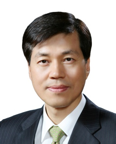Leadership At "The Best CMO In The World"

By Louis Garguilo, Chief Editor, Outsourced Pharma

- Part 2 of an Exclusive Interview with Samsung BioLogics President & CEO Tae Han Kim --
What does it take to be the best at anything? What kind of leadership is needed to inspire employees to perform at the highest levels? What confidence is required to proclaim: “The World’s Best CMO”?
We’ll get answers in this second part of our exclusive interview from BIO 2015 with Tae Han Kim, Ph.D., President and CEO of Samsung BioLogics. (You can find part one here.)
Better Than The Rest … Equals A Champion
On the Samsung BioLogics homepage is the phrase, “The World’s Best Manufacturing Service Provider.” Is this CEO Kim’s personal branding for his four-year old CMO?
“It’s certainly my target,” he says. “We entered this market knowing we could only generate revenue and profit by providing the most competitive manufacturing services and prices.”
 |
| Tae Han Kim, PhD, president and CEO of Samsung BioLogics |
The competition he specifically mentions – with respect – are Lonza and Boehringer Ingelheim. “Our new clients have also been their clients. We’ll be compared,” Kim says. “So what are the criteria for the best manufacturing? First, provide top-quality service. Second, have capacity and scale. Third, offer integrated services for drug substance and drug product. Fourth, do all this at reduced cost and production timelines … I mean what else would you like?” He then seems to answer his own question by quickly adding, “Of course inherent in all activities is the complete safety of employees, accomplished through “plant design and construction, training and corporate policies.”
Kim then sums up the superlative CMO:
“I define the CMO champion as having the largest, top-quality manufacturing capacity, the largest revenue, and the greatest profit.”
He says he’s behind in one of those categories, with Samsung BioLogics currently third in capacity. “However,” he swiftly interjects, “every Samsung BioLogics employee shares the same vision and target: Within the year 2020 we shall be the biggest player in capacity, revenue, and profitability.”
I’ve been around my share of corporate CEOs, in various countries. Almost all are remarkably capable individuals; few lack in healthy ego. Kim’s pronouncements, though, originate from a more baseline conviction that universal and fundamental business practices, faithfully implemented and adhered to, and coupled with one’s intrinsic advantage – the experience of high-tech manufacturing at Samsung is his – can make you the best. His is a genuine enthusiasm for the possibility of superior accomplishment.
“There’s no mystery,” says Kim. “My staff and I are just business people, reading and learning, and trying to understand basic business principles. Do better in plant design and construction. Improve operating margins and maximize yields and success rates. Provide the best service to your client. If we do these things better than anybody else, we are the best,” he says.
On Leadership: Channeling Peter Drucker
Kim, a 35-year veteran of Samsung, says the job of CEO starts with cultivating a corporate culture, and corporate culture derives day-to-day from implementing the correct company policies.
“It’s important for the CEO to set appropriate policy,” he says. “For example, we pay an employee more for better performance. You are promoted faster. That is a set policy by which a competitive culture is formed. Everybody strives to do better. To perform better, you must keep training yourself, read books, learn and think. So we create an environment for this policy to thrive.”
Kim shows me a document titled, “DNA of Samsung BioLogics,” a quadrant with subtitles such as “Our Business Strategy” and “Our Culture + Policy.” Under the latter is a bullet point for a “T-Type Talent,” an idea Kim borrowed from Malcolm Gladwell’s book Outliers. “In this knowledge-based industry,” Kim explains, “you need a minimum of ten-thousand hours of practice and study in a defined area or specialty, for example in our business, in producing recombinant proteins. One needs expertise in various cell lines, purification techniques, QC, and QA.”
Kim applies these expectations for the “T-Type Talent” to himself as well as the 730 employees at his company. His personal ten-thousand hours focus on business management. Within those hours he has devoted a fair amount of time to Peter Drucker, the Austrian-born, American management consultant, educator, and author, often credited as developing the thinking and practices of modern corporations.
“I hadn’t read Drucker for a while when I started building our company,” he says. “I told my staff we must build a common vision, set up a common goal, we need to develop good and clear policies, and so on. Thereafter I happened to pick up one of my Drucker books and started reading. I was stunned: What I have outlined and implemented at Samsung BioLogics are all described right there. So this is not mine, what we are building. It’s from many business experts I have digested, and whose knowledge and wisdom I carry with me.”
Now And The Year 2020
Obviously – or he wouldn’t have entered the fray to begin with – Kim sees the biopharma industry in general and the CMO space specifically in sustained growth patterns. He also sees the biologics CMO competition heating up. He says that ten years ago there were far fewer players, and also fewer molecules competing for supremacy.
“Advanced optimization and cost reduction were not that critical,” he says. “The industry was just less competitive.” Today, with more companies pursuing more drugs, and the introduction of biosimilars, for example, biopharma companies look to obtain “maximum optimization.”
“Sometimes,” Kim says, “you need to optimize your portfolio overall, sometimes your value chain, and sometimes you need to optimize by more outsourcing. You may also look at diversified business models. But one common direction is you want to optimize your productivity and cost structure.” To help his customers accomplish all of this, he sees opportunities for deeper relationships, various collaboration models, and real leadership at CMOs.
Kim also notes the varying capacity environment. While currently capacity is tightening in specific areas (e.g., mammalian cell culture, aseptic fill-and-finish), the past decade saw challenges across-the-board with over-capacity. Kim says that era depressed pricing and new investments at CMOs, and he “fully evaluates the supply-demand situation for the industry.”
“We have strong capabilities in plant design, so we would build more capacity if needed,” he says. “What’s important is I can rationalize a return on investment from business efficiencies, not from raising prices.” He then adds some perspective to his thinking: “In the biologics CMO business, Samsung is a four-year old child … we’ll have fulfilled our first ten-year plan in 2020.” By which time he’s certain he’ll be that undisputed CMO Champion.
So what does it take to be the best? For Kim, it’s mastering and implementing the fundamental principles of business, and applying them to your discipline and built-in advantages.
How do you inspire employees to the highest levels of excellence? Provide leadership by creating corporate policies that spur achievement, and an environment to support advancement.
And finally, what confidence does it take to proclaim you are the best CMO? Only the confidence in knowing there is no mystery to becoming the best, and that the above two – implementation of sound fundamentals and inspired leadership – are truly the path to business success.
